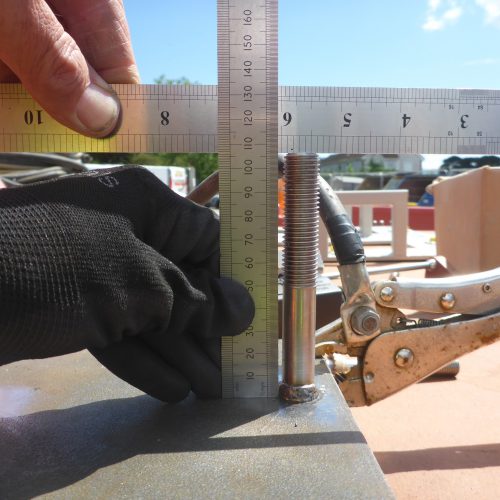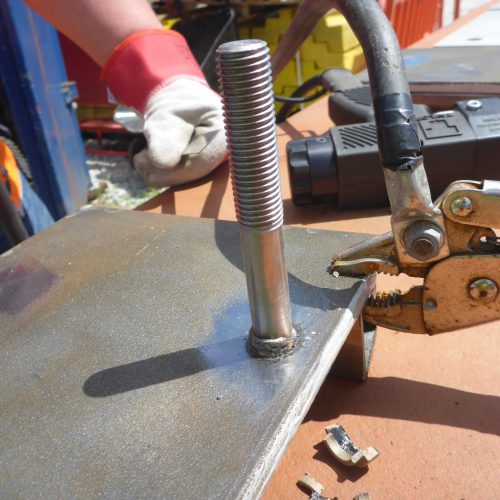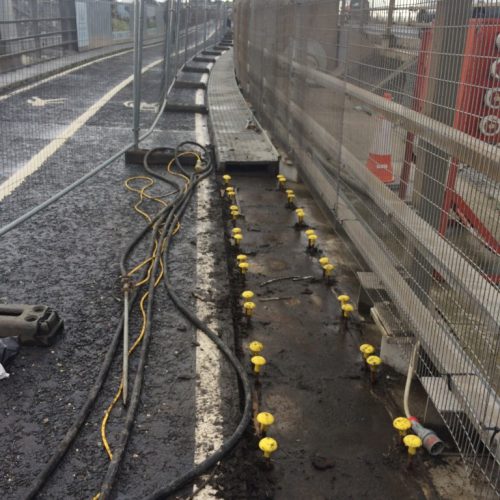Recent inspections identified that the deck waterproofing and steel bolts holding the kerb units in place were nearing the end of their serviceable life and needed replacing. The works are essential to prevent the steel bridge deck from corroding and to ensure the continued safety of those crossing the bridge.In order to replace the waterproofing system and steel bolts, the scheme involves the removal and reinstallation of approximately 7,200 kerbs (equivalent to 3.6 kilometres if laid end to end). Constructed using recycled plastic from 5 million milk cartons, the lightweight kerbs form a vital part of the vehicle restraint system.
Thanks to the recent fine weather significant progress has been made on the south cantilever over the past few weeks, with the site installation trials successfully completed. These trials were vital to ensure that the works can be installed to the appropriate standards on a repetitive basis.
So far, the contactor has removed 1,200 kerbs and 4,800 steel bolts from the inside (north) kerb line of the south cantilever and cleaned and prepared this section of steel deck. Additionally, they have installed 2,000 new stainless steel bolts, applied 600 meters of new waterproofing and reinstalled 500m of kerb units.
With work on the inside face of the south cantilever now three quarters complete, contractors are due to switch to the remaining outer (south) kerb line where the same process will be repeated. This final section is expected to be completed by 24 September.
Access across the south cantilever of the bridge for pedestrians, cyclists and mobility scooters will be maintained until 24 September and there will be no impact on other bridge users until after this time.
Work will begin on the westbound lane of the main deck on 25 September. At this point the south cantilever will be closed to pedestrians, cyclists and mobility scooters. It will remain closed to these groups for the remainder of the scheme. This will enable the south cantilever to be used by all other traffic, meaning that we can maintain the four traffic lanes that the bridge usually operates.
A free shuttle bus service will be provided for all pedestrians, mobility scooters and cyclists who are being advised not to attempt to use the south cantilever lane or mix with vehicles on the main deck for safety reasons.
The shuttle buses will operate every 15 minutes throughout the day and every 20 mins during the night between the Tamar Bridge car park and Fore Street in Saltash. Collection and drop off points will be clearly signposted at each location.
Tamar Bridge and Torpoint Ferry Joint Committee and Highways England are meeting regularly to discuss the impact of these works on drivers and how disruption can be kept to a minimum. Drivers are advised there could be delays during the work, particularly at peak times, and to plan their journeys and listen to the latest traffic reports.
“The Tamar Bridge is a vital transport link between Cornwall and Devon and we are committed to completing the scheme as quickly and safely as possible. Keeping four traffic lanes open at all times to reduce potential disruption and delays means we need to close the south cantilever to pedestrians, cyclists and mobility scooters for the remaining phases of the scheme. The free shuttle buses will be operating around the clock to ensure that we can meet the needs of local residents and commuters and we will be reviewing the service during the works and adjusting it if necessary. “



